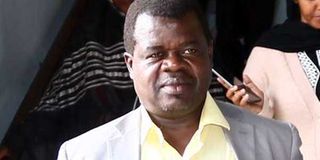Public litigation: Where would we be without Okiya Omtatah?

Activist Okiya Omtatah. FILE PHOTO | NATION MEDIA GROUP
What you need to know:
Two weeks ago, he was in court in a case he had filed about Sony Sugar offloading brown sugar it had imported from Brazil.
It is the same Mr Omtatah who last October saved consumers from a hike in prices of bottled water, juice, soda and other soft drinks.
Kenyans will also remember him for the cases he filed regarding last year’s General Election.
As activist Okiya Omtatah walked from his office at Nairobi’s Social Security House on Friday afternoon, a woman stopped him at an adjacent bus stop.
She had read about his push to have the Kenya National Examination Council return candidates’ slips after marking and she liked the idea.
After a brief chat, she gave him Sh1,000 to support photocopying of documents for the case that is scheduled for hearing before Justice John Mativo on January 24.
“She said she’s very concerned about the case,” Mr Omtatah told the Nation.
The woman might well be among thousands of Kenyans who have lately been asking themselves: Where would we be without Mr Omtatah?
LIFT BAN
The activist on Thursday delivered a win for thousands of passengers and bus companies after convincing High Court judge Enoch Chacha Mwita to temporarily lift a ban on night travel that was issued on December 31.
Two weeks ago, he was in court in a case he had filed about Sony Sugar offloading brown sugar it had imported from Brazil.
Though Lady Justice Roselyn Aburili did not grant his wish in her January 4 ruling, Mr Omtatah had made a point.
It is the same Mr Omtatah who last October saved consumers from a hike in prices of bottled water, juice, soda and other soft drinks.
This is after he convinced Justice Mativo to issue a temporary order suspending a gazette notice that required fixing excise duty stamps on the drinks’ packaging.
Kenyans will also remember him for the cases he filed regarding last year’s General Election. One of them, concerning the October 26 repeat of the presidential election, is still at the Supreme Court.
There is also a suit he lodged relating to last year’s ban of plastic packaging by the government that is still pending hearing before a three-judge bench of the Environment and Land Court.
GREATEST VICTORIES
One of his greatest victories, he said during Friday’s interview, was in 2014 when he convinced the High Court to order the police to restore toll-free emergency number 999.
“We fought very hard. The Attorney-General opposed it but ultimately I won and the President launched it. It is one of the Jubilee achievements now,” he said. “It has helped so many people, more than I even imagined.”
A playwright of no mean repute, Mr Omtata, also lists his 2013 battle for the staging controversial play Shackles of Doom by Butere Girls High School as having been one of his peak moments.
The play was to be staged at the national level in Mombasa during festivals that were to be held between April 16 and April 24, 2013. But it was banned through an April 1, 2013 letter to the school principal. Mr Omtatah challenged the ban and won after government officials changed tune.
“Even the school did not want to be associated with it but eventually it was staged and it won. That really touches my heart because it is creative writing and the government was going to gag these children,” he said.
LITTLE MONEY
Given the timing and magnitude of the cases he files, it is easy to say Mr Omtatah is a litigant-for-hire. But he vehemently fought such a notion.
“I move on my own. When I make some little money in the business I do, I use it,” he shot back. Filing such cases, he said, is his way of “paying rent” on earth, adding that he earns his keep from buying and selling cereals.
“I don’t have money to hire a lawyer, but I know with Sh10,000, I can prosecute a case. My business doesn’t require me to be there all the time,” he said.
In fact, he prefers to prosecute matters on his own because he fears lawyers can get compromised and derail a case.
“I used to hire lawyers, and occasionally I do even now. But I got betrayed twice, where deals were struck by lawyers and the cases were compromised. That’s when I began following up the matters myself,” he said.
And in defence of his court-loving habit, Mr Omtatah said he only litigates public interest matters. He recounted cases where individuals had approached him to sue on their behalf.
PUBLIC LAW
“I refer them to lawyers because I don’t handle anything that is not public law. There has to be a public interest that is clear and visible on the face of it,” he said.
Besides his business, Mr Omtatah says he gets by because of his literary works.
He has a number of plays to his name, like Lwanda Magere, Voice of the People, Chains of Junkdom and An Exchange for Honour.
“They are now being taught in the US. I also get good royalties from there which I survive on,” he said. “Some have not even been published here.”
He said he is an active writer and is currently working on a novel “on the impact of China in this country – some creative work on how we are going to be Chinese very soon”.
For his participation in public litigation, he definitely has enemies.
Among his areas of litigation have been around public officials who should leave office, from Fazul Mahamed of the NGO Coordination board to John Njiraini of the Kenya Revenue Authority to Supreme Court judges who reach the age of 70.





